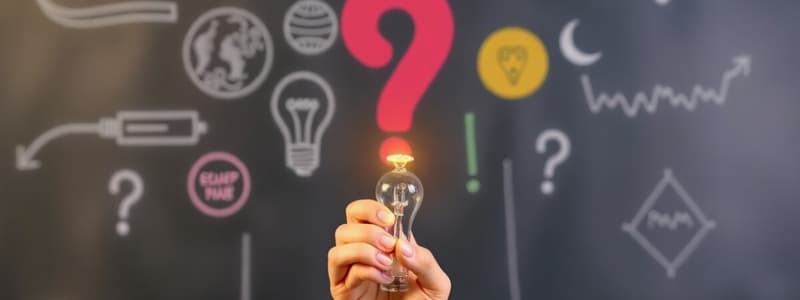Podcast
Questions and Answers
Critical thinking involves questioning, analysing, and interpreting information.
Critical thinking involves questioning, analysing, and interpreting information.
True (A)
Critical thinking is solely about evaluating mathematical figures.
Critical thinking is solely about evaluating mathematical figures.
False (B)
Making a judgement is not a part of critical thinking.
Making a judgement is not a part of critical thinking.
False (B)
Evaluating what you say is one of the components of critical thinking.
Evaluating what you say is one of the components of critical thinking.
Critical thinking only applies to written information.
Critical thinking only applies to written information.
Flashcards
Critical thinking definition
Critical thinking definition
Thinking that involves questioning, analyzing, interpreting, evaluating, and judging information.
Key aspect of critical thinking
Key aspect of critical thinking
Questioning, interpreting, evaluating, and judging information.
Analyzing information
Analyzing information
Breaking down information into parts to understand it better.
Evaluating information
Evaluating information
Signup and view all the flashcards
Judging information
Judging information
Signup and view all the flashcards
Study Notes
Defining Critical Thinking
- Critical thinking is a process of actively and skillfully conceptualizing, applying, analyzing, synthesizing, and/or evaluating information gathered from, or generated by, observation, experience, reflection, reasoning, or communication, as a guide to belief and action.
- It involves questioning, analyzing, interpreting, evaluating, and forming a judgment about information.
- This process is applicable to various forms of input, including written texts, spoken words, and personal experiences.
Aspects of Critical Thinking
- Questioning: A core element of critical thinking is challenging assumptions and seeking clarification. This includes asking "why," "how," and "what if" questions.
- Analyzing: Breaking down complex information into smaller parts to understand the relationships between them. This involves identifying the main arguments, evidence, and supporting details.
- Interpreting: Making sense of the analyzed information. This involves drawing inferences, conclusions, and connections.
- Evaluating: Assessing the credibility, relevance, and validity of the information. This involves considering potential biases, assumptions, and fallacies.
- Judging/Forming a judgment: Making a reasoned decision or conclusion based on the analysis and evaluation. This step often involves weighing different perspectives.
Key Characteristics of Critical Thinkers
- Open-mindedness: Willingness to consider different viewpoints and perspectives, even if they conflict with their own.
- Skepticism: Having a healthy doubt about information and claims, demanding evidence and reasoning.
- Objectivity: Trying to avoid personal biases and emotions when evaluating information.
- Curiosity: A desire to learn more and ask deeper questions.
- Truth-seeking: A commitment to finding the most accurate and reliable information.
- Logical reasoning: Using sound reasoning and avoiding fallacies in arguments.
Applications of Critical Thinking
- Problem-solving: Using critical thinking to identify root causes of problems and develop effective solutions.
- Decision-making: Analyzing options, assessing benefits and drawbacks, and making choices based on evidence.
- Reasoned judgment: Constructing coherent arguments, weighing evidence carefully, and forming justifiable conclusions.
- Effective communication: Clearly expressing ideas, identifying and responding to counterarguments, and actively listening to others.
Areas requiring critical thinking:
- Reading academic texts: Identifying author's claims and supporting evidence, and understanding the intended argument.
- Listening to speeches and presentations: Critically examining the speaker's reasoning and evaluating the validity of arguments.
- Evaluating personal experiences: Recognizing biases, assessing the credibility of sources, and determining the significance of events.
- Understanding news and current affairs: Analyzing perspectives, identifying potential biases, and developing informed opinions.
Studying That Suits You
Use AI to generate personalized quizzes and flashcards to suit your learning preferences.




